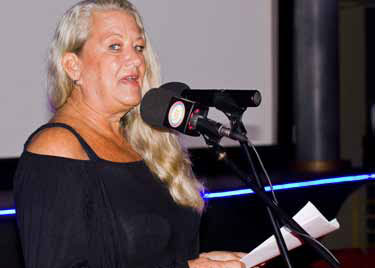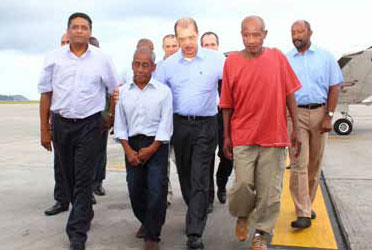Captain Phillips: A true story of Somali piracy
Special premiere screening highlights Seychelles’ role in the fight against the scourge
THE MINISTRY of Home Affairs and Transport, in collaboration with Deepam Cinema, hosted the Seychelles premiere screening of the new Hollywood film, Captain Phillips, the true life drama of a sea captain taken hostage by Somali pirates after his cargo vessel was hijacked.
Highlighting the significance of Somali piracy to Seychelles, the feature film was preceded by a special 15 minute preview of the documentary Pirates in Paradise: Seychelles, an intriguing investigation into the rise of Somali piracy in the region, and Seychelles’ role in the fight against the scourge.

|
Sandra Hanks, sister to the film’s star Tom Hanks, was MC for the event
|
This special screening, which was held on Thursday [14 Nov] evening, also featured a foreword by Seychelles resident Sandy Hanks, sister to acclaimed actor Tom Hanks, who starred in the role of Captain Richard Phillips. Speaking before the screening, Ms. Hanks read out a special message from Tom Hanks to the Seychelles audience, in which he stated that he hoped the film would go a long way to highlight the perils of Somali piracy and bring a deeper understanding of the situation to the minds of the international community. Read the Opening Speech HERE. The red carpet affair was organised by Minister Joel Morgan and the Ministry of Home Affairs and Transport, the government entity at the fore of Seychelles’ fight against piracy. Invited guests included other ministers, ex-President Sir James Mancham and various other international diplomats associated with Seychelles and with an interest in the country’s anti-piracy endeavours.
Also in attendance were past Seychellois hostages, including Rolly Tambara and Marc Songoire, the two fishermen who spent 367 days in captivity and were released in November last year. Speaking after the screening, both men stated that the film was painful to endure and brought back many memories of what they had been through. Mr. Tambara even likened scenes where Captain Phillips is manhandled to specific experiences he had had and the way he had been treated. Viewing such a film little over a year since their real-life nightmare ended could not have been easy.
The film itself, although only the story of one specific event, is a powerful insight into the Somali piracy situation and the horror of suffering an attack and hostage situation. The nail biting build up as the attack takes place heightens the sense of horror that seamen endure when faced by an attack, and as the hostage drama unfolds, one realises the sheer lack of reason in which piracy situations unfold.

|
Rolly Tambara and Marc Songoire return to Seychelles after 367 days
as hostages in Somalia
|
In the film, the pirates themselves, played by Somali actors, are absolutely terrifying in their brutality and desperation. On his return to Seychelles, Mr. Tambara shuddered as he told President James Michel that “these people [Somali pirates] are not humans.
They are very bad, just bad.” This comes through in the film, and the actors seem almost too convincing in their roles. With nothing to lose, the actors offer audiences a powerful glimpse into the real-life Somali pirate condition – a violent ruthlessness born from utter desperation and depravity.
To the film’s credit, which avoids pitting Somali pirates as the evil bad guys against the innocent victims, Captain Phillips does address some of the real issues behind piracy. The audience is given the opportunity to understand the conditions in Somalia that have given rise to the phenomenon, as well as the socio-economic circumstances that could drive men to do what these pirates do.
At one point, Muse (played by first time actor, Barkhad Abdi), the leader of the pirate crew, brags to Captain Phillips that the year before he had captured a Greek ship that was ransomed for USD 6 million. To which Captain Phillips responds, “So what are you doing here then?”
Muse, taken aback and with a sobering look on his face, doesn’t answer. You realise in this moment just how sad the Somali piracy situation is. These desperate men, with nothing to lose and little to live for, are merely the puppets in a much bigger picture.
The men and boys who carry out the attacks, who risk their lives at sea and bravely attack any vessel they can, are as much victims as the hostages they take. They are the victims of a failed nation state, the victims of a world that has robbed them of a better alternative and the victims of a more sinister criminal system that has taken advantage of their vulnerability.
Once again it is Muse, in his final scene of the film, that conjures such sympathies. As he is arrested and informed of Captain Phillips’ rescue and the fate of his fellow pirates, the look on his face as he realises that everything he has been through was for nothing – a look of sheer defeat and desperation - is a haunting insight into the human condition faced by the men who carry out the dirty work of Somali piracy.
Although their brutality never allows you to completely sympathise with the perpetrators, the actors’ powerful rendition of this pirate crew does balance the film and leaves room for the audience to understand the complexities behind the Somali piracy issue. In this regard, the film echoes the sentiments of both President James Michel and Minister Morgan, who state in the Pirates in Paradise: Seychelles documentary that the problem does not lie with the pirates themselves, but with the socio-political circumstances in Somalia.
For as long as Somalia remains a lawless and ungoverned nation, and until these desperate men have an alternative to piracy, the waters of the Indian Ocean will not be safe. Seychelles, at the centre of anti-piracy efforts in the region, will have no option but to continue fighting the good fight to keep our waters and shipping lanes safe and free. With one in five of our nation’s prisoners being Somali pirates, already the situation is dire. However, with the continued support of the international community, the country can continue to keep the terror at bay, and hopefully never again will one of our residents have to endure the fate of Rolly Tambara, Marc Songoire and Captain Richard Phillips.
Captain Phillips is now showing at Deepam Cinema and is open to public audiences. The documentary Pirates in Paradise: Seychelles will be coming to SBC soon, and should not be missed by anyone interested in Seychelles’s fight against the scourge of Somali Piracy.
By N. Gower TODAY
 Subscribe to our newsletter. Receive a weekly round-up of all piracy-related news.
Subscribe to our newsletter. Receive a weekly round-up of all piracy-related news.
OCEANUSLive.org
Information, Security, Safety; Shared
Submitted by Team@oceanuslive.org